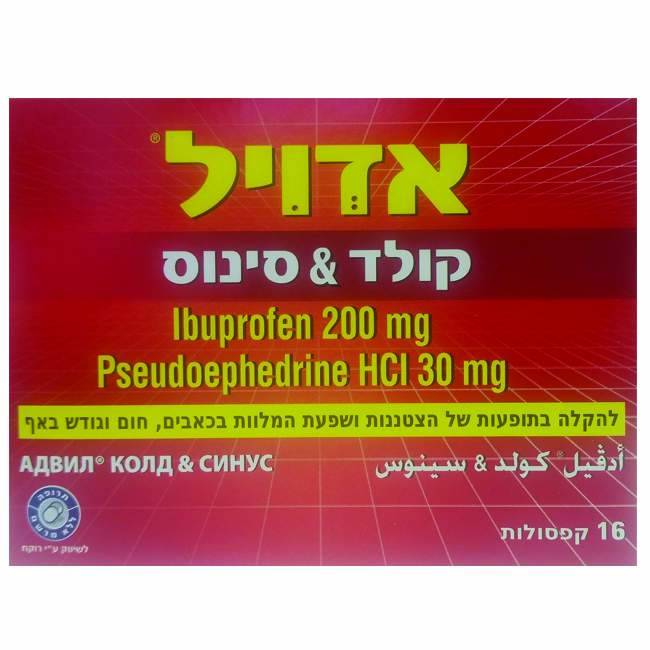Quest for the right Drug

אדויל קולד & סינוס ADVIL COLD & SINUS (IBUPROFEN, PSEUDOEPHEDRINE HYDROCHLORIDE)
תרופה במרשם
תרופה בסל
נרקוטיקה
ציטוטוקסיקה
צורת מתן:
פומי : PER OS
צורת מינון:
קפסולות ממולאות נוזל : CAPSULES LIQUID FILLED
עלון לרופא
מינוניםPosology התוויות
Indications תופעות לוואי
Adverse reactions התוויות נגד
Contraindications אינטראקציות
Interactions מינון יתר
Overdose הריון/הנקה
Pregnancy & Lactation אוכלוסיות מיוחדות
Special populations תכונות פרמקולוגיות
Pharmacological properties מידע רוקחי
Pharmaceutical particulars אזהרת שימוש
Special Warning עלון לרופא
Physicians Leaflet
Adverse reactions : תופעות לוואי
4.8 Undesirable effects The most common observed adverse events are gastrointestinal in nature. Peptic ulcers, perforation or GI bleeding, sometimes fatal in the elderly, may occur (see section 4.4). Nausea, vomiting, diarrhoea, flatulence, constipation, dyspepsia, abdominal pain, abdominal distension, mouth ulcerations, melaena, haematemesis, ulcerative stomatitis, exacerbation of colitis and Crohn’s disease (see section 4.4) have been reported following administration. Less frequently, gastritis has been observed Hypersensitivity reactions have been reported following treatment with Ibuprofen. These may consist of; a) non-specific allergic reaction and anaphylaxis, b) Breathing: respiratory tract reactivity comprising of asthma, aggravated asthma, bronchospasm or dyspnoea, Skin: assorted skin disorders, including rashes of various types, bruising pruritis, urticaria, purpura, angiodema and more rarely, exfoliative and bullous dermatoses (including epidermal necrolysis and erythema multiforme). c) Very rarely, bullous reactions including Steven’s – Johnson syndrome and toxic epidermal necrolysis. Clinical studies suggest that use of ibuprofen, particularly at a high dose (2400 mg/day) may be associated with a small increased risk of arterial thrombotic events (for example myocardial infarction or stroke) (see section 4.4). Oedema, hypertension, angina pectoris and cardiac failure have been reported in association with NSAID treatment. The following list of adverse effects relates to those experienced with ibuprofen and pseudoephedrine hydrochloride at OTC doses, for short-term use. In the treatment of chronic conditions, under long- term treatment, additional adverse effects may occur. Patients should be informed that they should stop taking Advil Cold & Sinus immediately and consult a doctor if they experience a serious adverse drug reaction.Infections and Ibuprofen Very rare Exacerbation of infectious inflammations (e.g. infestations necrotizing fasciitis), Aseptic meningitis (stiffness of the neck, headache, nausea, vomiting, fever or disorientation in patients with pre-existent autoimmune diseases (SLE, mixed connective tissue disease)) Blood and lymphatic Ibuprofen Very rare Haematopoietic disorders (e.g. anaemia, system disorders leucopenia, thrombocytopenia, pancytopenia, agranulocytosis) Immune system Ibuprofen Uncommon Hypersensitivity reactions with urticaria, disorders pruritus and asthma attacks (with drop in blood pressure) Ibuprofen and Very rare Severe generalised hypersensitivity reactions, pseudoephedrine signs may be facial, oedema, angioedema, hydrochloride dyspnoea, tachycardia, drop in blood pressure, anaphylactic shock Psychiatric Ibuprofen Very rare Psychotic reactions, depression, nervousness. disorders Pseudoephedrine Not known Agitation, hallucination, anxiety, abnormal hydrochloride behaviour, insomnia, excitability, irritability, nervousness, restlessness Nervous system Ibuprofen Uncommon Central nervous system disturbances such as disorders headache, dizziness, sleeplessness, agitation, irritability or tiredness Ibuprofen Not Known Cerebrovascular accident (stroke) Pseudoephedrine Not known Haemorhagic stroke, ischemic stroke, hydrochloride convulsion, headache, insomnia, nervousness, anxiety, agitation, tremor, hallucinations, dizziness, psychomotor hyperactivity. Pseudoephedrine Not known Posterior reversible encephalopathy syndrome (PRES) (see section 4.4) Reversible cerebral vasoconstriction syndrome (RCVS) (see section 4.4) Eye disorders Ibuprofen Uncommon Visual disturbances Pseudoephedrine Not known Ischaemic optic neuropathy hydrochloride Ear and labyrinth Ibuprofen Rare Tinnitus disorders Ibuprofen Not known Vertigo Cardiac disorders Ibuprofen Very rare Palpitations, heart failure, myocardial infarction, oedema, hypertention Pseudoephedrine Not known Palpitations, tachycardia, chest pain, arrythmia hydrochloride Vascular disorders Ibuprofen Very rare Arterial hypertension Pseudoephedrine Not known Hypertension hydrochloride Respiratory, Pseudoephedrine Rare Exacerbation of asthma or hypersensitivity thoracic and hydrochloride reaction with bronchospasm mediastinal disorders Gastrointestinal Ibuprofen Common Dyspepsia, abdominal pain, nausea, vomiting, disorders flatulence, diarrhoea, constipation, anorexia, minor gastrointestinal blood loss in rare cases leading to anaemia Ibuprofen Uncommon Gastric ulcer with bleeding and/or perforation, gastritis, ulcerous stomatitis, exacerbation of colitis and Crohn’s disease (see section 4.4) Ibuprofen Very rare Oesophagitis, pancreatitis, intestinal diaphragm- like stricture Pseudoephedrine Not known Dry mouth, thirst, nausea, vomiting, ischaemic hydrochloride colitis Hepatobiliary Ibuprofen Very rare Hepatic dysfunction, hepatic damage, disorders particularly in long-term therapy, hepatic failure, acute hepatitis, jaundice Skin and Ibuprofen Uncommon Various skin rashes subcutaneous tissue disorders Ibuprofen Very rare Bullous exanthema such as Stevens-Johnson syndrome, and toxic epidermal necrolysis (Lyell syndrome), alopecia, severe skin infections, soft-tissue complications in a varicella infection Ibuprofen Not known Angioedema, erythema multiforme, skin eruption, rash, purpura, pruritus, urticaria. Drug reaction with eosinophilia and systemic symptoms (DRESS syndrome). Pseudoephedrine Not known Rash, urticaria, pruritus, hyperhidrosis. hydrochloride Pseudoephedrine Severe skin reactions, including acute hydrochloride Not known generalized exanthematous pustulosis (AGEP) Renal and Urinary Ibuprofen Rare Kidney-tissue damage (papillary necrosis) and disorders elevated uric acid concentrations in the blood Ibuprofen Very rare Oedemas (particularly in patients with arterial hypertension or renal insufficiency), nephrotic syndrome, interstitial nephritis, acute renal insufficiency Ibuprofen Not known Hematuria, renal failure, proteinuria, oliguria Pseudoephedrine Not known Difficulty in micturition (Urinary retention in hydrochloride men with urethra-prostatic disorders.) Investigations Ibuprofen Not Known Haematocrit decreased and haemoglobin decreased General disorders Ibuprofen Not known Oedema, swelling, peripheral oedema and administration site conditions Reporting of suspected adverse reactions Reporting suspected adverse reactions after authorisation of the medicinal product is important. It allows continued monitoring of the benefit/risk balance of the medicinal product. Any suspected adverse events should be reported to the Ministry of Health according to the National Regulation by using an online form https://sideeffects.health.gov.il/ Healthcare professionals are asked to report any suspected adverse reactions to email: il.safety@gsk.com

שימוש לפי פנקס קופ''ח כללית 1994
לא צוין
תאריך הכללה מקורי בסל
לא צוין
הגבלות
לא צוין
מידע נוסף
